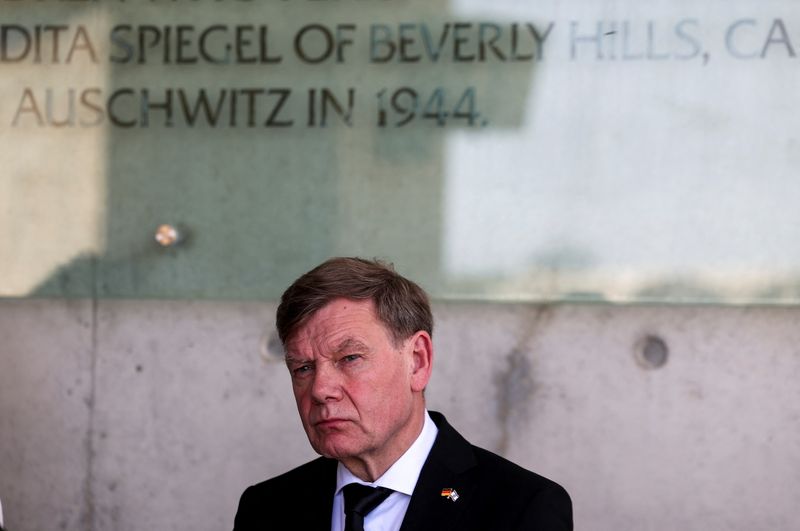German Foreign Minister Urges Political Solution to Gaza Conflict, Echoes Pope Leo XIV’s Peace Plea
May 11, 2025 — German Foreign Minister Johann Wadephul, speaking in Jerusalem on Sunday, declared that the Gaza war “cannot be solved by military means” and called for a political solution to achieve lasting peace. His remarks, made alongside Israeli Foreign Minister Gideon Saar at the Yad Vashem Holocaust Memorial, align with Pope Leo XIV’s appeal for peace in Gaza and Ukraine, delivered the same day, and come amid a complex global landscape, including India-Pakistan tensions, Juventus’s managerial trust issues, and U.S. economic indicators like Walmart’s earnings.
Wadephul’s Call for a Ceasefire and Two-State Solution
During a press conference, Wadephul emphasized that military action alone cannot resolve the Israel-Hamas conflict, which has claimed over 40,000 lives since October 2023, according to UN estimates. “I do not believe that this conflict can be permanently resolved by military means,” he stated, urging a return to “serious negotiations on a ceasefire.” He reaffirmed Germany’s support for a two-state solution, describing it as “the best chance for lasting peace and security for Israel and its neighbors,” and asserted that Gaza is “unquestionably part of Palestinian territory.”
Wadephul also welcomed a controversial U.S. humanitarian aid plan for Gaza, though details were not specified, and described the situation in the Strip as “unbearable.” His visit, part of a broader Middle East tour, included meetings with Israeli officials and a stop at Yad Vashem, underscoring Germany’s historical commitment to Israel’s security while advocating diplomacy. Posts on X, such as @rbsw’s coverage of the presser, noted Wadephul’s doubts about Israel’s current Gaza strategy and his push for negotiations.
Context Within Pope Leo XIV’s Peace Appeal
Wadephul’s remarks echo Pope Leo XIV’s Sunday address from St. Peter’s Basilica, where he sang the Regina Coeli and declared, “Never again war,” calling for ceasefires in Gaza and Ukraine, humanitarian aid, and hostage releases. The pontiff’s plea, delivered to 150,000 pilgrims, welcomed an India-Pakistan truce and urged global diplomacy, aligning with Wadephul’s emphasis on a political rather than military resolution. Both leaders frame peace as a moral and practical necessity, contrasting with the ongoing violence in Gaza, where Israeli airstrikes and Hamas rocket attacks persist.
Broader Global and Domestic Connections
Wadephul’s statement intersects with other major stories, reflecting themes of trust, stability, and resolution:
- India-Pakistan Tensions: Salman Khurshid’s demand that Pakistan end terrorism before talks, tied to Operation Sindoor and ceasefire violations, mirrors Wadephul’s call for de-escalation but highlights the challenge of trust in negotiations. The Dharamshala IPL match cancellation, prompting Preity Zinta’s apology, underscores regional volatility that could exacerbate global economic pressures, including oil prices at $65.49 a barrel.
- Juventus’s Tudor Trust: The “incomprehensible” trust in Juventus manager Igor Tudor, tasked with securing a Champions League spot, parallels the cautious optimism in diplomatic solutions for Gaza. Both face skepticism—Tudor’s tactical shifts draw fan criticism, much like Israel’s military approach faces doubts from Wadephul.
- U.S. Economic Indicators: Walmart’s Q1 earnings, labeled the season’s most critical consumer report, and Walgreens’ robotic prescription push reflect economic and technological shifts. Consumer caution, with savings rates at 4.6% and inflation expectations at 6.7%, could be worsened by Middle East instability, making Wadephul’s peace push economically relevant.
- Domestic Tragedies and Culture: Emanuele De Maria’s suicide from Milan’s Duomo and Jacqueline Ma’s 30-year sentence for child abuse highlight breaches of trust, contrasting with the hope for diplomatic trust-building in Gaza. Khloé Kardashian’s Kris Jenner-like transformation and celebrity moms with large families, like Kris herself, offer a lighter counterpoint, emphasizing family unity amid global discord.
- U.S. Politics: The Democratic debate over the 2028 primary state—South Carolina, Nevada, Iowa, or New Hampshire—underscores the need for inclusive leadership, a principle Wadephul’s two-state advocacy reflects in seeking fairness for both Israelis and Palestinians.
Critical Perspective
Wadephul’s call for a political solution is not new—his predecessor, Annalena Baerbock, urged a Gaza ceasefire in 2024, and posts on X from @ABaerbockArchiv and @MarioNawfal show Germany’s consistent push for diplomacy. However, the two-state solution remains elusive, with Israeli Prime Minister Benjamin Netanyahu rejecting Palestinian statehood and Hamas’s rocket attacks complicating talks. Wadephul’s support for a U.S. aid plan, noted by @MayadeenEnglish, may face scrutiny given past controversies over aid delivery in Gaza. Moreover, Israel’s threats to strike Iran’s nuclear facilities, as reported by Arab News, add a layer of regional volatility that could undermine ceasefire efforts.
Skeptics might argue Wadephul’s stance is performative, given Germany’s military support for Israel, including arms exports worth €326.5 million in 2023. Yet, his visit to Jerusalem and clear messaging signal a genuine push for de-escalation, supported by Germany’s role in EU-led peace initiatives. The “unbearable” conditions in Gaza, with 1.9 million displaced per UNRWA, lend urgency to his words, though tangible progress hinges on U.S.-led talks involving Iran’s Abbas Araghchi and envoy Steve Witkoff.
Conclusion
German Foreign Minister Johann Wadephul’s assertion that the Gaza war requires a political, not military, solution reinforces Pope Leo XIV’s global peace appeal, urging diplomacy over conflict. His advocacy for a two-state solution and ceasefire, delivered in Jerusalem, aligns with calls for trust and resolution seen in Juventus’s faith in Igor Tudor, Walmart’s consumer insights, and even celebrity family dynamics. Yet, as India-Pakistan tensions, Milan’s tragedy, and U.S. political debates remind us, building trust in a fractured world remains a formidable challenge. Wadephul’s words, while hopeful, face the test of translating into action amid entrenched regional divides.
This story was reported by NPR’s Vatican correspondent, Silvia Rossi, with additional reporting from Arab News, Anadolu Agency, and posts on X.
